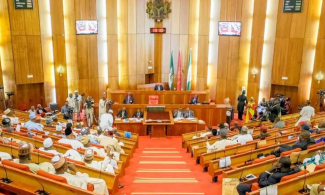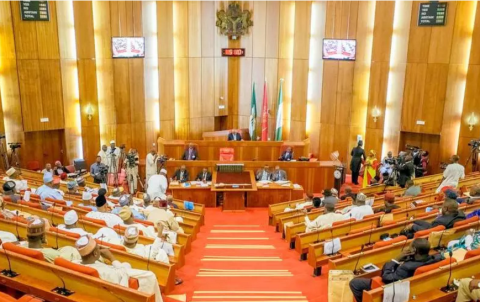
“Every word, facial expression, gesture, or action on the part of a parent gives the child some message about self-worth. It is sad that so many parents don't realize what messages they are sending.” – Virginia Satir
I arrived home after several weeks at my Place of Primary Assignment (PPA) to see my family at my residence in Ibereko, few kilometres off the Nigerian-Benin border. After refreshing myself and passing the night, I woke up the following morning to go spend some moments with my mum in her shop where she sells provisions as expensive as a N250 pack of sugar and low-priced as a N5 sachet water, popularly called pure water.

Hardly had the discussion began that my mum, unknown to her began a tale that would forever remain glued to my consciousness.
“See Modiu,” my mum began, “on several occasions, the mechanic across the road had asked me if i was interested in buying several goods ranging from bags of rice, sardines to tomato pastes. Just last week, a friend of your fathers’ called to inform me about a number of goods whom the seller needed to dispose off ASAP.
“Although their prices are always far below market prices, at every instance, I turned them down politely–not by rejecting their offers outrightly like a saint, but by lying.”
“Lying”? I asked.
“Yes,” my mum continued.
“I only tell them I won't be needing the goods as i have them in excess in the shop–although I might have ran out of stock. Had you been around often, you would have noticed that the mechanic does not bother advertise any product to me anymore as I’m sure he had fathomed that I do not deal in such.”
“But buying them will not only save you the stress of spending several hours scouting for them in the market, it would also increase your profits”; I retorted.
My mum looked at me.
“Modiu.” She called. “You realise it’s from this shop I partner with your father to feed, clothe and made you a graduate today. I was able to do that because I never bought such goods. I do not because whenever a man walk up to you to sell a product weigh below the market price, it’s either the person is a thief who stole it, a government official who seized and sells it illegally, or a criminal who engages in fake and substandard products. The day you stand in front of this shop and observe its emptiness, do not ask further–just know that one of those goods have found their way up on the shelf.”
What did this old woman just utter, I asked myself? Although her words that morning were not surprising as they bore similitude to previous ones, I could not help but ponder on them vis-a-vis the Nigerian condition as it relates to societal ethics and cromulent business values.
In a world where every entrepreneur teaches you nothing except to grow your business from zero to plenty, and where the economist tells you when it comes to business, neither morality nor religion should be made to interfere with it, you're sitting pretty with an old woman who sees such as an act of indirect larceny to man, criminal to constituted authority, and sinful to God.
If i had thought that my mum's word would be all i would hear for the day, i was in for a big surprise.
After a couple of hours alone in the shop, my dad got back from work and we exchanged pleasantries. He barely sat before another round of discussion was birthed. Like the effect of my mum’s words, I was left in a state of suspended animation.
"Look at Obinna, the spare-part seller. The end of the month (December 2015) would make it a year since he paid his rent.” My dad complained. "You’re more educated and exposed than I am, what do you think I can do to make him honour the tenancy agreement”?
“Close his shop off course.” I replied.
“That would not be bad considering the fact that he knows I have on several occasions appealed to him to pay up. The problem is I notice that his lifestyle has changed–I’m sure he does not make sales the way he used to.” He explained.
“But he feeds his family.” I said swiftly.
“Son, I heard about a landlady that died yesterday a few blocks away. The day she died, she had just returned from Seme border where she took her personal money to go help a woman start a business. The woman was said to be in conflict with her husband who is a tenant of hers and a bid to quench the incessant controversies which were clearly lit by the inability of the husband to fend for the family, the old house owner decided to set her up. Immediately they returned from the market, she died.
“Clearly, the old lady had bought paradise for herself."
As my old man spoke, i saw jealousy written all over his face as though the clock should move in the reverse direction in order to place him in the landlady's stead.
These are the teachings of my parents, Alhaji and Mrs. Musibau Olaguro.
These are what they've–for 25 years–instilled in me that have made me grow up with extreme bile for the Nigerian condition: institutionalised indiscipline, authority stealing and blatant disregard for the laws of the land.
Now it becomes necessary to ask if our sybaritic politicians sit with their kids. If they do, what pattern of discussion do they have with their young ones? As the first role model to children, what kind of moral does Nigerian politicians and leaders who double as parents put into their kids? What could be going on in the minds of Olisa Metuh’s children each time they read his press releases especially the one he alleged that the president was only persecuting retired Colonel Sambo Dasuki for fear of his political clout and not because the former NSA looted the treasury?
Could Femi Fani-kayode have instilled so much good in his children to make them challenge him on why at 55, he still finds it amusing to gallivant around with his girlfriend? What about Ayodele Fayose, how many strokes of cane does he receive from his children for being so rabid, morbid and uncouth?
Could the Fashola Jnrs’ have read about the N78m state fund-sponsored personal website of their fathers’ and weep for Nigeria? How does the Senate President Bukola Saraki define corruption and public trust each time he sits to mentor his children?
I think our journalists have ignored this important aspect in their investigative works. Save the brief exchange between Iyabo Obasanjo and his father–which were not necessarily instigated by altruistic motives–Nigerians have not been able to identify a politician whose world view, political leaning and idiosyncrasies are at variance with those of his children.
With the nation so littered with criminal elements clad in saintly garb, it would be a disaster if the seeds of our leaders are as selfish and corrupt as their parents.
Modiu Olaguro, a youth corps member teaches mathematics at Jebba.
Email: [email protected]
Twitter: @ModiuOlaguro
Website: www.ghettosassembly.wordpress.com